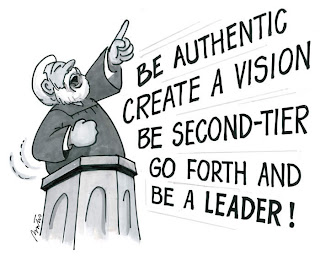By Jim Crocker, past CEO and now Chair of Boardroom Metrics. Jim works with private and not-for-profit clients on corporate strategy and governance. His partner Karen McElroy leads an international business writing team that helps clients write and win RFP's.
Tuesday, July 21, 2009
The Best Management Technique
Being able to tell someone they're going to fail if they keep up what they're doing.
Getting them to face the reality of who they are, what they're doing and what the consequences will be.
Having the guts to pass along bad news. Early. And swiftly.
Having the credibility and the compassion to do it thoughtfully. Articulately. And with impact.
Having the confidence that passing along the truth is a selfless act aimed at helping not hurting.
Failing to be honest is a failure to manage. It wrecks careers. It sabotages results.
Honest feedback is a gift. Providing it isn't easy. Knowing how isn't ordinary. Doing it takes courage.
Setting someone on the right track is worth it.
Saturday, January 19, 2008
Role of the Board - Part III
Part I describes the importance of the Board's governing role. See Part I here.
Part III looks into the natural tension that exists between governing and operating.....
.........so how should organizations deal with the quiet disconnect between management and the Board over the Board's role? Does it even matter?
I have a few thoughts.
First, if there is an underlying tension between the Board and management it is natural and healthy. While overall goals of the Board and management are aligned - success of the organization - at the end of the day management's role and the Board's role are different: management operates and the Board judges management's performance.
Second, Boards and Board Chairs need to be more explicit about their roles - with themselves and with management. By being more explicit - "our role is to govern and to assess management's performance" - Board's set expectations for their role that don't set directors or management up for disappointment.
Third - and Boards seem to be doing this - Board's need to get better at their governance roles. Governance in particular is not simple. While some issues are black and white, many require in-depth knowledge of law, business, policy, and decision making process. Only by stocking Boards with diverse, independent and experienced directors can consistent, timely and correct governance decisions be made.
Typically, larger business organizations are more advanced in performing their governance roles. Smaller organizations, and too many not-for-profit organizations appear to struggle with governance and seem destined to continue doing so.
Board composition is a key factor. Small company boards are frequently over-stocked with self-interested parties: investors, service providers, friends and family. Not-for-profits, even the ones that attract strong, experienced board members, frequently also attract, or are mandated to include, representatives from stakeholder groups who may have little or no Board experience.
In summary, I believe it DOES matter that Board's explicitly identify that their primary role is governance, and what that means. By explicitly defining their role, Board members and management teams get more satisfaction from their Board involvement. Everyone quickly comes to see that by providing strong governance, the Board IS making a significant contribution to the organization.
Tuesday, January 15, 2008
Role of the Board of Directors - Part I
Q. What's one of the biggest complaints CEO's have about their Boards?
A. "The Board is a waste of time - it doesn't add any value."
Q. What's one of the biggest complaints Board members have about their Boards?
A. "This Board feels like a waste of time - it doesn't feel like we're adding any value."
Q. What's going on here?
A. Who said the role of the Board is to add value?!
It's not - at least not in the context of masterminding the next I-Pod or the next outsourcing strategy. That's up to the management team.
The role of the Board is to govern - some Boards are even called Boards of 'Governors'. There are 5 key elements of governing effectively:
- ensuring that the organization has the right CEO
- ensuring that the organization has a strategic planning process
- learning the business and the industry well enough to have a well-formed perspective on benefits and risk of the organization's strategic direction
- monitoring to ensure that strategies are being executed as planned
- monitoring to ensure that the Board is governing effectively
The Board role is a mix of three things:
- out-front leadership (CEO and planning process)
- knowledge and insight (business of the organization)
- monitoring and compliance (measurement and policies).
See part II Role of the Board of Directors here.
See part III here.
Leadership Smeadership
Okay. I know it’s a settings thing. Sometime, a long, long time ago – probably when leadership was being invented – I must have indicat...

-
In 2012 I've attended two HR conferences. They couldn't have been more different. The 2nd Annual Talent Management Development C...
-
These Daily Kos posts are just too fascinating to ignore. Electing an African American President, if it happens, will be a big deal....it...
-
Last night I got to have dinner with a group of 20 CIO’s. My role was to help bring the CEO perspective to them on what they do and h...

